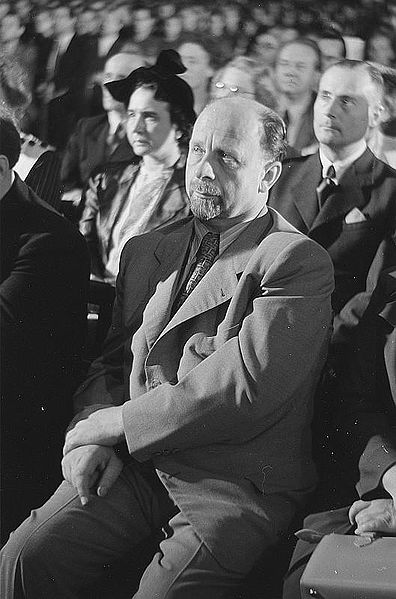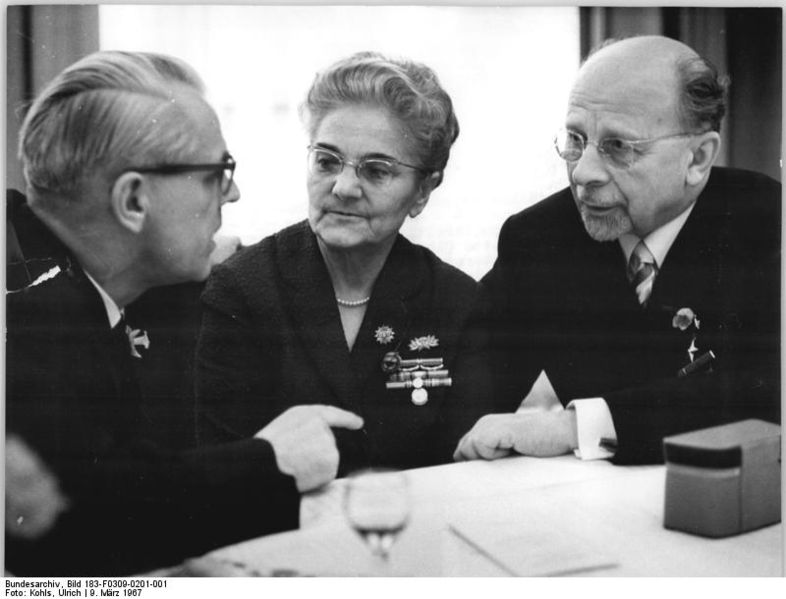<Back to Index>
- Aeroengineer Ludwig Bölkow, 1912
- Architect Dominikus Zimmermann, 1685
- Chairman of the Council of State of the German Democratic Republic Walter Ulbricht, 1893
PAGE SPONSOR


Walter Ulbricht (30 June 1893 – 1 August 1973) was a German communist politician. As General Secretary of the Socialist Unity Party from 1950 to 1971, he played a leading role in the early development and establishment of the German Democratic Republic (East Germany).
Ulbricht was born in Leipzig, Saxony, where his father worked as a tailor. He spent eight years in primary school (Volksschule). After leaving school he trained to be a joiner. Both his parents worked actively for the Social Democratic Party (SPD). Walter Ulbricht joined the party in 1912.
Ulbricht served in World War I from 1915 to 1917 in Galicia on the Eastern Front, and in the Balkans. He deserted in 1917, as he had opposed the war from the beginning. Imprisoned in Charleroi, in 1918 he was released during the German revolution. In 1917 he became a member of the Independent Social Democratic Party (USPD) after it split off from the Social Democratic Party (SPD) over support of Germany's participation in the First World War. During the November Revolution of 1918 he became a member of the soldier's soviet of his army corps and later a member of the Communist Party of Germany (KPD) in 1920, joining its Central Committee in 1923. Ulbricht attended the International Lenin School of the Comintern in Moscow in 1924/1925. The electors subsequently voted him into the regional parliament of Saxony (Sächsischer Landtag) in 1926. He became a Member of the Reichstag for South Westphalia from 1928 to 1933 and served as KPD chairman in Berlin from 1929.
In the years before the 1933 Nazi seizure
of power, paramilitary forces of the left and the right caused frequent
disturbances. Violence connected with demonstrations was common, with
supporters of each side fighting each other and the police. In 1931 the
Communists in Berlin decided on a policy of killing two police officers
for every communist demonstrator killed by police, and as a result Walter Ulbricht urged fellow communists Heinz Neumann and Hans Kippenberger to plan the murder of two Berlin police officers, Paul Anlauf and Franz Lenck. Erich Mielke (later to become Ulbricht's chief of national security) and Erich Ziemer carried out the killing. In 1932, the Comintern ordered the Communists to cooperate with the Nazis against the Social Democrats, so Ulbricht and Joseph Goebbels (the Nazi Gauleiter for
Berlin) both urged their respective constituents to support the Berlin
transport workers' strike in November 1932. At an event arranged by the Nazi Party in
January 1931, Walter Ulbricht was allowed to deliver a speech. Subsequently Goebbels delivered his own speech. The attempt at
discussion became the opposite of friendly, and a struggle between
Nazis and Communists began: police officers divided them. Both sides
had tried to use this event for their election propaganda. The strike ended after five days. The Nazi Party attained
power in Germany in January 1933, and very quickly began a purge of
Communist and Social Democrat leaders in Germany. Following the arrest
of the KPD's leader, Ernst Thälmann,
Ulbricht campaigned to be Thälmann's replacement as head of the
Party. Many competitors for the leadership were killed in the Soviet
Union thanks to Ulbricht. Ulbricht lived in exile in Paris and Prague from 1933 to 1937. The German Popular Front under the leadership of Heinrich Mann in
Paris was dissolved after a campaign of behind-the-scenes jockeying by
Ulbricht to place the organization under the control of the Comintern. Ulbricht tried to persuade the KPD founder Willi Münzenberg to
go to the Soviet Union, allegedly so that Ulbricht could have "them
take care of him". Münzenberg refused. He would have been in
jeopardy of arrest and purge by the NKVD, a prospect in both Münzenberg's and Ulbricht's minds. Ulbricht spent some time in Spain during the Civil War,
as a Comintern representative, ensuring the liquidation of Germans
serving on the Republican side who were regarded as not sufficiently
loyal to Stalin; some were sent to Moscow for trial, others were
executed on the spot. Ulbricht lived in the Soviet Union from 1937 to 1945. During the German-Soviet alliance 1939 - 1941, Ulbricht promoted in the Comintern journal
'Die Welt' the official line of co-operation with Nazi Germany. Thus,
he opined that the German government declared itself ready for friendly
relations with the Soviet Union, whereas the English-French war bloc
desires a war against the socialist Soviet Union. The Soviet people and
the working people of Germany have an interest in preventing the
English war plan.“ Following
the German invasion of the Soviet Union in 1941, Ulbricht was active in
a group of German communists under NKVD supervision (a group including,
among others, the poet Erich Weinert and the writer Willi Bredel)
which, among other things, translated propaganda material into German,
prepared broadcasts directed at the invaders, and interrogated captured
German officers. In February 1943, following the surrender of the
German Sixth Army at the close of the Battle of Stalingrad, Ulbricht, Weinert and Wilhelm Pieck conducted
a Communist political rally in the center of Stalingrad which many
German prisoners were forced to attend. The NKVD head Lavrenty Beria described Ulbricht as "the greatest idiot that he had ever seen." In April 1945 Ulbricht led a group of party functionaries ("Ulbricht group")
into Germany to begin reconstruction of the German Communist party
along orthodox Stalinist lines. Within the Soviet occupied zone of
Germany, the Social Democrats and Communists united to form the
Stalinist dominated Socialist Unity Party of Germany (Sozialistische Einheitspartei Deutschlands or SED), and Ulbricht played a key role in this. After the founding of the German Democratic Republic on 7 October 1949, Ulbricht became Deputy Chairman (Stellvertreter des Vorsitzenden) of the Council of Ministers (Ministerrat der DDR) under Chairman Otto Grotewohl. In 1950, he became General Secretary of the SED Central Committee; this position was renamed First Secretary in 1953. After the death of Joseph Stalin his position was in danger for some time, because of his reputation as an archetypal Stalinist. Ironically, he was saved by the Berlin Uprising of 17 June 1953, because the Soviet leadership feared that deposing Ulbricht might be construed as a sign of weakness. At the third congress of the SED in 1950, Ulbricht announced a five-year plan concentrating
on the doubling of industrial production. As Stalin was at that point
keeping open the option of a re-unified Germany, it was not until 1952
that the party moved towards the construction of a socialist society in
East Germany. By
1952, 80 percent of industry had been nationalised. Blindly following
an outmoded Stalinist model of industrialisation – concentration on the
development of heavy industry regardless of the cost, availability of
raw materials, and economic suitability – produced an economy that was
short of consumer goods, and those that were produced were often of
shoddy quality. Growth was also hampered by a deliberate exclusion from
the higher educational system of children of 'bourgeois' families. One
consequence was the flight of large numbers of citizens to the West:
over 360,000 in 1952 and the early part of 1953. In 1957, Ulbricht arranged a visit to a East German collective farm at Trinwillershagen in order to demonstrate the GDR's modern agricultural industry to the visiting Soviet Politburo member Anastas Mikoyan. Following the death of Wilhelm Pieck in 1960, the SED abolished the function of President of the GDR and instead created a new institution, the Staatsrat der DDR (Council of State of the GDR), of which Ulbricht, as leader of the party, became Chairman and therefore Head of State. From this point until the early seventies, Ulbricht was the unquestioned leader of the party and the country. Although modest economic gains were being made, emigration still continued. By 1961, 1.65 million had fled to the west. On 13 August 1961, work began on what was to become the Berlin Wall,
only two months after Ulbricht had emphatically denied that there were
such plans ("Nobody has the intention of building a wall"). The 1968 invasion by Warsaw Pact troops of Czechoslovakia and the suppression of the Prague Spring were
also applauded by Ulbricht – East German soldiers were among those
massed on the border but did not cross over, probably due to Czech
sensitivities about German troops on their soil – and earned him a
reputation as a staunch Soviet ally in contrast to Romanian leader Nicolae Ceauşescu, who condemned the invasion. From 1963, Ulbricht and his economic adviser Wolfgang Berger attempted to create a more efficient economy through a New Economic System (Neues Ökonomisches System or
NÖS). This meant that under the centrally coordinated economic
plan, a greater degree of local decision-making would be possible. The
reason was not only to stimulate greater responsibility on the part of
companies, but also the realization that decisions were sometimes
better taken locally. One of Ulbricht's principles was the 'scientific' execution of politics and economy – making use of sociology and psychology but most of all the natural sciences.
The effects of the NÖS, which corrected mistakes made in the past,
were largely positive, with growing economic efficiency. The New Economic System was not very popular within the party, however, and from 1965 onwards opposition grew, mainly under the direction of Erich Honecker and with tacit support of Soviet leader Leonid Brezhnev.
Ulbricht's preoccupation with science meant that more and more control
of the economy was being relegated from the party to specialists. Also,
Ulbricht's motivations were at odds with communist theory, which did not suit ideological hardliners within the Party. Ulbricht's
difficult relationship with Leonid Brezhnev proved to be his eventual
undoing. On 3 May 1971 Ulbricht was forced to resign from virtually all
of his public functions 'due to reasons of poor health' and was
replaced – with the consent of the Soviets – by Erich Honecker. He was
allowed to remain head of state as Chairman of the Council of State.
Additionally, the honorary position of Chairman of the SED was created especially for him. Ulbricht died at a government guesthouse in Groß Dölln near Templin, north of East Berlin, on 1 August 1973, during the World Festival of Youth and Students, having suffered a stroke two weeks earlier. He was honoured with a state funeral and buried among other communists in the Zentralfriedhof Friedrichsfelde. Ulbricht remained loyal to Leninist and Stalinist principles throughout his life, rarely able or willing to make compromises. Inflexible and unlikeable (Anthony Beevor described him as "widely loathed Stalinist bureaucrat well known for his tactics denouncing rivals".),
he was an unlikely figure to attract much public affection or
admiration. However, he also proved to be a shrewd and intelligent
politician who knew how to get himself out of more than one difficult
situation. Despite stabilising the GDR to some extent, he never
succeeded in raising the standard of living in the country to a level
comparable to that in the West. In 1956, Ulbricht was awarded the Hans Beimler Medal,
for veterans of the Spanish Civil War, which caused controversy among
other recipients, who had actually served on the front line. He was awarded the title Hero of the Soviet Union on 29 June 1963. When Ulbricht visited Egypt in 1965, he was awarded by Nasser the Great Collar of the Order of the Nile. Ulbricht lived in Majakowskiring, Pankow, East Berlin. Ulbricht was married twice; in 1920 to Martha Schmellinsky and from 1953 until his death to Lotte Ulbricht née Kühn (1903 - 2002). The couple adopted a daughter from the Soviet Union named Beate (1944 – 1991).

